12:55
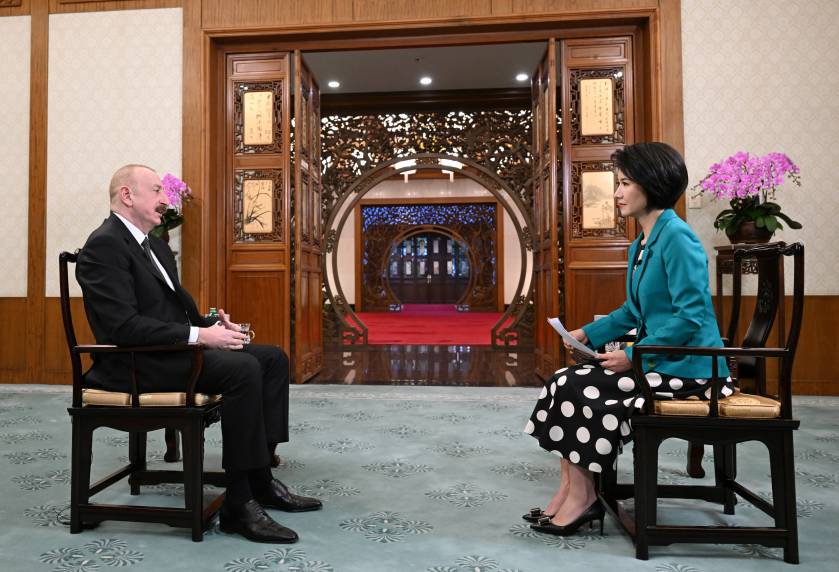
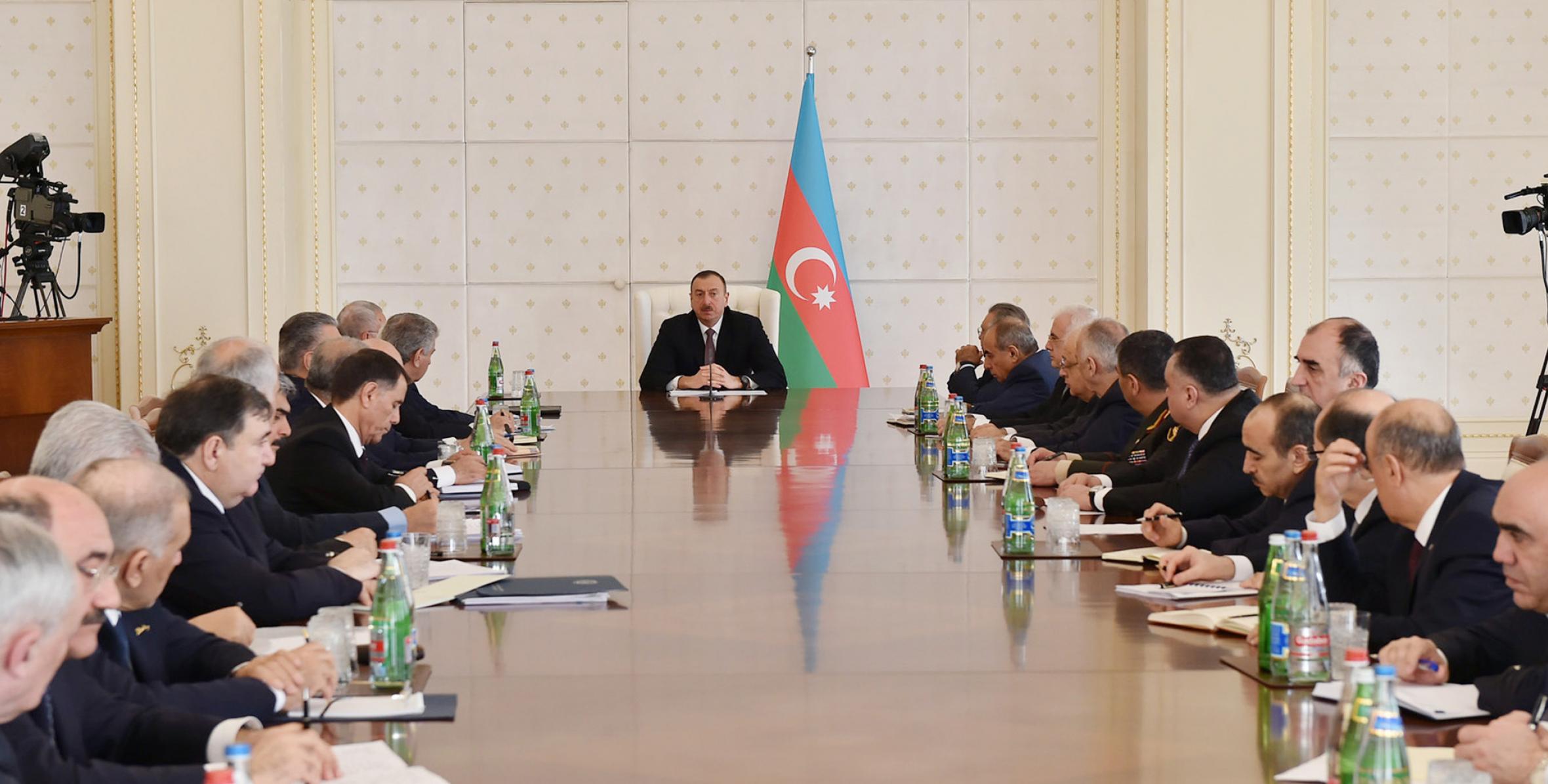
- As I have already mentioned, we are very pleased with the indicators for the first quarter. We must try to keep this pace until the end of the year and ensure national economic development.
As I mentioned in my opening remarks, the non-oil sector remains a priority. All necessary measures are being taken. I believe that this year our non-oil sector may grow even more. Growth of 7 per cent in the first few months, of course, is an excellent result. We should try to make sure that the non-oil sector accounts for a very large share of the gross domestic product. However, it is also true that a few years after the commissioning of the Southern Gas Corridor our gas exports will be increased dramatically. Thus, our oil and gas sector will grow even more. We will therefore need to take further measures to ensure that the non-oil sector is always ahead of the oil sector. We are taking these measures. These, of course, include infrastructure projects which create conditions for economic development in the regions. At the same time, there is a good attitude, attention and support of the state for entrepreneurs.
During the year I regularly meet with entrepreneurs. These meetings take place every year and we discuss the state program of socioeconomic development of the regions. In addition, during my visits to the regions, I attend the opening of various industrial facilities. Thus, the political support provided to entrepreneurs is quite large. At the same time, the government is taking other measures to promote private enterprise development. The National Fund on Entrepreneurship Support provides loans on favorable terms. These loans contribute to the development of the real economy and create conditions for the creation of jobs. This year we have also allocated a fairly large sum in loans. These loans subsequently return in full and are re-issued to entrepreneurs as a resource base. There are funds in the state budget envisaged for business development. At the same time, entrepreneurs are provided with loans which were issued in previous years and have been repaid. In other words, the repayment of these loans also creates the conditions for business development.
I can say that a very large class of entrepreneurs has emerged in Azerbaijan. From now on, the overall growth of our country will depend more on the development of entrepreneurship. Of course, the strategic areas that are in state monopoly should remain in state hands. These include the strategic transport infrastructure, the oil and gas sector and the strategic energy infrastructure. These areas should be controlled by the state so that work here is done in a consistent manner. Of course, when the key infrastructure is in state hands, control over tariffs is also exercised by the state. It prevents the tariffs from rising and having a negative impact on people's lives.
The other spheres are already emerging thanks to the private sector. Around 80 per cent of our gross domestic product is generated in the private sector. Last year was declared a "Year of Industry" and, as I have already said, this area received a lot of attention. We must fully provide ourselves with all building materials. We are already close to that. I voiced these figures in earlier meetings. We currently produce and export many types of building materials. And we need new markets for exports.
It is not so easy to access new markets – products must be competitive and affordable. For its part, the government provides entrepreneurs with this support because fuel in Azerbaijan is relatively cheap. The price of gas sold to the private sector and the general public is very low – only 100 manats. The world price is several times higher. The price of electricity is quite low. So these are great benefits provided by the government for the development of entrepreneurship. This is an additional benefit for the competitiveness of Azerbaijani products. And entrepreneurs need to make effective use of that.
First of all, the price of goods sold in the country should not be artificially inflated. The state controls this area. At the same time, in order to access foreign markets, the price must be reasonable, of course. In other words, if tariffs on fuel in Azerbaijan were not at such a low level, it would create major problems for entrepreneurs. Business people should realize that this is great support from the state. Entrepreneurs are provided with loans, political support and even the guidelines of the Ministry of Economy and Industry. Various packages of recommendations are provided for the volume of investments.
There is rapid industrial development in the regions as well. We have already identified several industrial centers. This is the time to create an industrial zone in each district. The first zone is being created in Neftchala. According to my information, local entrepreneurs are very enthusiastic and interested in this. We are even seeing that the number of entrepreneurs working in this industrial zone is higher than we expected. This is very gratifying. This is the first pilot project. I think that we now have to create similar zones in other districts. I expressed my thoughts about that a few months ago – each district should have a special place. There should be infrastructure, transport routes – everything you need to ensure that our industrial capacity develops in one place.
This year has been declared a "Year of Agriculture". It is also a testament to the emphasis placed on this sector. Industry and agriculture are the sectors that contribute to the successful economic development of any country, especially a country like Azerbaijan. After all, almost half of our population lives in the regions, in the countryside. Food security is a priority for us, because we have yet to fully ensure that. But we have come a long way in this direction. Azerbaijan is self-sufficient in basic food commodities now. In some cases, however, some components of these commodities are imported. I think that it is certainly a viable option at the first stage. But we must try to ensure that all components of food produced in Azerbaijan are also made in Azerbaijan: from seeds to finished products. Therefore, we are creating and will create a whole chain. First of all, of course, we create industrial enterprises, i.e. processing plants. In some cases, the goods produced by these enterprises were imported from abroad as raw material and were packaged here. This was the first stage. Now we are moving on to the main stage. There should be complete localization because food security will be the biggest issue for the world in the future, and countries not providing for their own food security will be faced with great problems.
Of course, the principles of a market economy are fundamental for us. We both import and export. But we see that when we depend on certain sources, this may lead to problems sometimes, including those related to prices. The work we have done in recent years has enabled us to keep inflation at a very low level. Why? We are not particularly dependent on external markets, on external food markets. Local production is already fairly strong. If local production is fully based on local raw materials, then the processes ongoing abroad, the crises or the decline in oil prices will not have any impact on us.
Therefore, food security is of top priority. The process of increasing local production is under way. Processing enterprises are being established in various locations. Our export opportunities are also expanding. Now we also need to expand the range of our exports. Azerbaijan has traditionally exported fruits and vegetables. Now we must export more finished and other products, i.e. dairy products. In the future, we should export meat and other products.
Very serious measures are being taken for agricultural development. Reforms are carried out. Electronic registration of lands is a very important issue at the current stage. If we can achieve that, then there will be transparency and we will know exactly what we have. Sometimes the maps available do not correspond to reality. This issue is being clarified and revised now. The allocated land parcels do not reflect reality. The images obtained from the satellite do not coincide with the data indicated on the map. This is a very serious matter. Major mistakes were committed in this area in the past. So now we have to readjust everything. Electronic records are necessary for entrepreneurs to know what land they own. At the same time, the state must know what land it has, what is and what is not cultivated on this land. Sometimes people take land and then change its purpose. Or land is fenced and just stored as property. This should not be allowed to happen. In order to make things completely transparent here, we must resolve the issue of electronic registration of lands. It's not just about statistics. It is about crops and about our agricultural policy. In addition, we can give recommendations and provide additional benefits: if you grow these crops on this land, fine! The state will give you more subsidies and help because it is necessary for the state and the country. Therefore, it is a very serious matter. I know that the Ministry of Agriculture is working hard on this. All relevant bodies should also join this work, so that we could have electronic records of land. All discrepancies should be eliminated.
In recent years we have paid great attention to irrigation and land reclamation. We have allocated major financial resources to this area. I think that this policy was absolutely correct. The Takhtakorpu and Shamkirchay water reservoirs are now in operation. From now on, these reservoirs will serve us all the time. The irrigated area will increase a lot, it is already increasing, and land reclamation activities will be carried out in the future too. Now we need to attend to the construction of canals more. The reservoirs have been created. Power plants have also been built on these water reservoirs, there are canals as well. But it is also important to branch out canals, because we must provide water to the allocated lands as much as possible. These figures have been voiced many times. We will include more than one hundred thousand hectares of new lands into the circulation and improve irrigation of the existing lands. This work, of course, is of great importance. I always keep this area in focus.
While visiting Khizi District last year, I was shown empty and unsuitable lands there. Now water will be supplied to these lands. Before the end of this year, more than 3,000 hectares of land in Khizi District will be provided with water. This is always in the spotlight. Overall, as a result of the operation of the Takhtakorpu water reservoir, thousands of hectares of land will be irrigated. What crops will be grown there? This should be determined by the Ministries of Agriculture, Economy and Industry. Entrepreneurs will be provided with assistance and loans. After that, the entrepreneurs will be told what they should grow there. There can be no arbitrariness and confusion here. The government pursues this policy, provides recommendations and directions, because we need to know what crops must be grown and marketed. Otherwise, we are likely to encounter certain problems here. There are profitable products which bring more money and there are products which bring less money. There are products that quickly recover the investment and there are products that take longer to pay back. We must know all this now – what the state needs to meet the domestic demand and where we will export these products.
We are now looking for and finding new markets. There are traditional markets. Our traditional market is the Russian market, and most of our agricultural products are exported to this market. A large logistical base is being created in the Kazakh city of Aktau now, where it is possible to store 10,000 tons of produce. This market is also very interesting for us. I believe that we will see tangible results in this area by the end of this year. Products conforming to the market demand should be grown on the new lands to be included in the circulation. Therefore, there must be complete state control and supervision here. We include hundreds of thousands of hectares of land in the circulation and provide irrigation. Billions have been spent on this. The funds invested in the construction of the Takhtakorpu and Shamkirchay water reservoirs account for nearly 1.5-2 billion manats. And then there are canals and other measures. Why? In order to create opportunities for people to live better, for farmers to cultivate products and earn money so that we properly use this produce, to provide the domestic market and stop the prices from rising, to sell products abroad so that both entrepreneurs and the state could earn more. So I want to say again that there can be no arbitrariness on the new lands to be included in the turnover. These lands should be used only as directed by the state. I am ordering the two ministries to rule out any outside interference.
Azerbaijan is already creating agricultural estates. This is also a great initiative. We have already laid the foundation of the first agricultural estate. The activities of large farms, the farms engaged in grain growing are expanding. The pilot project has paid off. The pilot project provided a yield of 55 quintals, although the country average was around 24 and in some places 25 quintals. So it was more than twice as high. Therefore, we must apply these pilot projects and this experience to all other areas in order to increase the yield. If we achieve that, we will be able to meet our need for grain and wheat using the available land.
In general, exports, the exports of agricultural produce and industrial goods will become the main driving force of our economy in the future. Exports bring the country foreign exchange reserves. The source of our foreign exchange reserves is oil and gas. We must produce and export food, industrial goods, construction materials and finished products, and we will go down this road.
Macroeconomic stability is always in the spotlight. Inflation is at a very low level. Last year I said that inflation this year would be in single digits. In the first quarter it grew by only 2.8 per cent. This is an excellent indicator despite the fact that the rate of the manat was amended in February and this could inadvertently affect the prices of imported goods. But as a result of the measures taken, the situation in the consumer market is absolutely stable. We did not allow prices to rise. Prices are stable and should remain stable.
I have already spoken on this subject and want to say again that, in general, the change of the manat rate was an inevitable phenomenon. When conducting the currency reform in 2005, we equated one manat to one dollar. Prior to that, one dollar was equal to 5,000 manats. This balance had to be maintained. In fact, we could not have allowed the manat to grow very expensive. The economists are well aware that this has a negative impact on local producers and hampers our export opportunities. However, the rapid development of the economy and the influx of oil revenues to the treasury strengthened the manat a lot, of course. In 2005, we conducted the monetary reform, while the Baku-Tbilisi-Ceyhan oil pipeline was commissioned in 2006. We began to receive large incomes. As a result, we saw that one manat was already at the level of 1.3 dollars. Then we saw that one manat was even more expensive than one euro. So it was a completely unnatural rate. We had to put an end to that, and all reputable international financial institutions today support and welcome our step. At the same time, the population sees that the change has not affected our daily lives – first of all because we produce most of the products of daily demand ourselves as a result of the work done in previous years. On the other hand, we have tightened control over the consumer market and taken measures against speculators.
As you know, we wanted to change the rate gradually and slowly. But then there was anxiety. People bought $500 million every day, and if that had gone on, the foreign exchange reserves of the Central Bank could fall sharply. Therefore, as a result of the measures taken, the diversification of our economy and our social policy, we did not allow unscrupulous people to take advantage of this situation. All this has contributed to the preservation of a stable situation.
My concern was also associated with prices on medicines. I issued a special instruction to exercise strict control over all pharmacies and prevent price increases. At the same time, I have to say that the pharmaceuticals market in Azerbaijan, unfortunately, has remained uncontrolled in a sense. In fact, it was unbearable. I can say that this drew more serious attention to this area, and we have revealed serious violations and imperfections here. In some cases prices on medicines are inflated several times, even up to 10 times. In other words, there were complete arbitrariness and anarchy in this area. Pharmacies sold medicines at whatever price they wanted. And people had to buy these medicines, spending heavily, especially pensioners who are in need of more medicines.
At the same time, low-quality medicines were imported to the country in some cases. So I told the Ministry of Health and the Ministry of Economy and Industry to establish complete control over the situation in this area. At the same time, I ordered the government to exercise strict control, and a new mechanism is being developed now. I do hope that we will begin to apply this mechanism in a few months and people should feel it in everyday life. Prices should not rise. In fact, I think that prices of some medicines should actually decline sharply.
In connection with this topic I want to note the following. This situation has shown once again how important domestic production is to the economy. Therefore, I am ordering the Ministry of Economy and Industry to prepare additional measures to stimulate local production and submit proposals, and we will make the necessary decisions and issue further instructions.
I should also note that Azerbaijan is not the only country where national currency has undergone depreciation. I have been provided with a note with some figures. I just want the Azerbaijani public to be aware of the events taking place around us of late. The situation in the region in the recent times has been as follows: the national currency of Kazakhstan has depreciated by more than 20 per cent, in Turkmenistan the depreciation has exceeded 20 per cent, in Georgia the national currency has fallen in value by more than 30 per cent, in Turkey the Turkish lira depreciated by 40 per cent over in 2013-2015, in Iran the national currency depreciated by 113 per cent in 2013-2015, the Russian ruble has recently dropped by 80 per cent. One of the leading currencies of the world, one of the two or three leading currencies, the Euro, has lost 25 per cent of its value. The Norwegian national currency has dropped by 34 per cent. I am voicing these figures just for comparison.
I would like to note again that the change of this rate in Azerbaijan actually means its reinstatement. We have restored the rate that was fixed in 2005. One manat was equal to one dollar at the time. Today one manat is equal to one dollar too. I think that this should be the case from now on. At the same time, we must further strengthen the fight against monopolies. It is necessary to take additional measures. In addition to boosting local production, we should pay attention to this area. If it is necessary to adopt some additional legislative or regulatory measures, we will do that. We must ensure free and fair competition.
This year we will continue the implementation of social infrastructure projects – the construction of schools, hospitals, kindergartens and vocational schools. Now there is a great need for that. This year we expect to open three more “ASAN xidmət” centers. The number of “ASAN xidmət” centers has reached eight – four in Baku and four in the districts. Three centers are now under construction. There are four centers in Baku now. “ASAN xidmət” centers have been opened in Ganja, Sumgayit, Sabirabad and Barda. Another center is now under construction in Baku. “ASAN xidmət” centers are also built in Gabala and Masalli now.
In the first quarter of this year, we conducted serious reforms in the electricity sector. We have established the "Azerishig" organization. "Azerishig" has been set up on the basis of the "Bakielektrikshebeke" Joint Stock Company, and the main goal is to improve power supply in the districts to the level of Baku. This was the main goal, because "Bakielektrikshebeke" has operated very successfully in Baku in recent years. Many have already forgotten the times of "Barmek". "Barmek" brought Azerbaijan to a deplorable plight! The "Barmek" infrastructure was in an appalling state before "Bakielektrikshebeke" took over from it! It is good that many have forgotten those days. But we all remember those dark nights. The younger generation probably does not remember that, and it is good.
There is still a lot to do in the districts. You know that I often visit the districts – practically every month. There are districts and cities I have visited more than 10 times. There is no place in Azerbaijan where I have not been to at least twice. When I come on a visit, I enquire. I also have other sources of information about how things are going with the provision of gas, drinking water and electricity. In some cases, the heads of local executive authorities try to portray a very positive picture. However, the reality is that power supply in the regions is not at the desired level. It is true that we have created major energy capacities and power plants. The energy potential we have created in recent years is bigger than the one that was created in the entire Soviet period. So many power plants have been created! If it hadn’t been for them, our current economic and industrial development would be impossible. So we have focused on this area in order to create generating capacities.
Both alternative hydroelectric and gas-fired power plants have been built in Azerbaijan. However, the plight of power lines is not very good, in particular in rural areas – as soon as there is a small wind, the pylons fall and power supply stops. This can’t be tolerated. I have repeatedly raised this problem and issued instructions to rectify the situation in this area. During meetings with people in the regions I listened to their requests and concerns. They said that power supply was often cut off and people were left without electricity. In a country such as Azerbaijan this situation is intolerable. Therefore, seeing that these administrative measures do not bear fruit, we moved on to structural reforms. I am sure that in the near future "Azerishig" will improve power supply of our cities and districts to the level of Baku. It is very difficult and challenging work.
We must make great effort now. However, the task has been set, and I want to emphasize this structural reform in the first quarter.
Environmental activities are always carried out in Azerbaijan, including Baku. Lakes are cleaned, trees planted and parks created. Baku is a city of parks and gardens today. At the same time, water treatment plants are established in the regions to provide people with drinking water. To address the problem of drinking water we work in three directions. In the first place, there are projects implemented by "Azersu". Drinking water projects have been completed in several cities. This process is welcomed and perceived well by the public. At the same time, this work is done by the "Irrigation and Water Management" Joint Stock Company. In addition, the Ministry of Ecology and Natural Resources builds sewage treatment plants in the villages along rivers. To date, clean drinking water has been provided to 480,000 residents of villages located along rivers, in particular the Kura and Araz. In 292 villages we have built modern treatment plants. Until now they used river water, allowed it to settle or took the water from canals. This negatively affected people’s health. At present, work is under way in 28 villages and treatment plants are constructed. These villages are home to 51,000 people. I believe that this work should be completed by the end of this year. Thus, these water treatment plants alone will provide drinking water to 530,000 people.
Little time is left for the European Games. The next meeting of the Cabinet of Ministers will be dedicated to the first six months of the year. Therefore, in the time remaining for the European Games all relevant agencies should work even harder. In fact, we are already completing all preparatory work. Transportation, infrastructure, technical, organizational and security issues are being addressed. The organizing committee is working well and fruitfully. The International Operations Committee is also working hard. Our sports facilities are practically ready. Last month we celebrated the opening of the Baku Olympic Stadium and the Baku Shooting Center. Final finishing work is under way at the Aquatic Palace. Repairs are in the final stages at the Heydar Aliyev Sports and Exhibition Complex. Work is being completed at the Sports Palace located on the boulevard. As you know, we are creating new sports facilities and, at the same time, repairing and reconstructing the centers that were created in previous years.
A European Games Park is being established. In fact, it was envisaged as a temporary sports facility. But if we consider that Baku will host Islamic Solidarity Games in 2017, I believe that the Games Park should stay after the European Games. Perhaps it will stay even after the Islamic Solidarity Games, because a beautiful recreation area is currently being set up in Baku. In the near future, our people will be able to enjoy a beautiful park and a recreation area stretching from the Flag Square to Bibiheybat. We are gradually expanding the boulevard. If you remember, the Flag square was handed over to the people a short while after being created. Now major construction and landscaping work is under way on the section from the Flag Square to Bibiheybat. Thus, together with the "White City" boulevard, the length of the boulevard will reach 16 kilometers.
The repair and restoration work at the Tofig Bahramov Stadium has been completed. Currently, relevant facilities are under construction there. Competitions in several sports will also be held at “Crystal Hall”. There, too, everything is ready. At the rowing base "Kur" in Mingachevir, temporary facilities and stands are being set up. The village of athletes is almost ready. A media village has been created. I can say that a media village is being created for the first time – in summer and winter Olympics media villages have never been created before and journalists had to stay in different places. We have shown attention to journalists and identified a great place for them to stay. They will live right next to the village of athletes.
There is a huge interest in the Games around the world. About 60 TV channels have signed broadcasting agreements for the Games. Thus, the world public will also watch the first European games "Baku-2015". We are in the final stages, so I am glad that we have done this work in a very short period of time – two and a half years. In fact, I had no doubt at all – after all, everything we start is always completed successfully. I am confident that the Games will be a great European festival of sport and friendship.
In short, the objectives are clear. We must work hard until the end of the year in order to successfully complete all the tasks and further strengthen our country. Thank you.

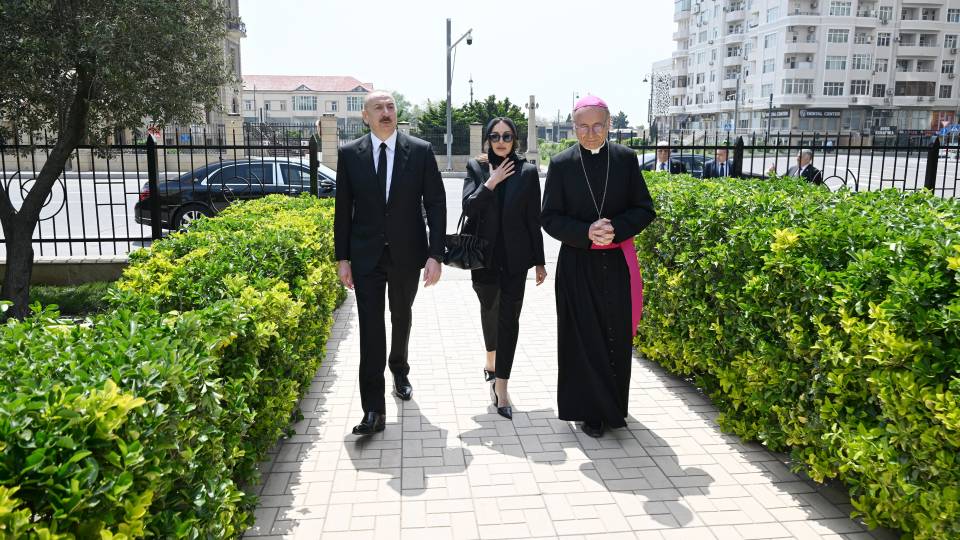
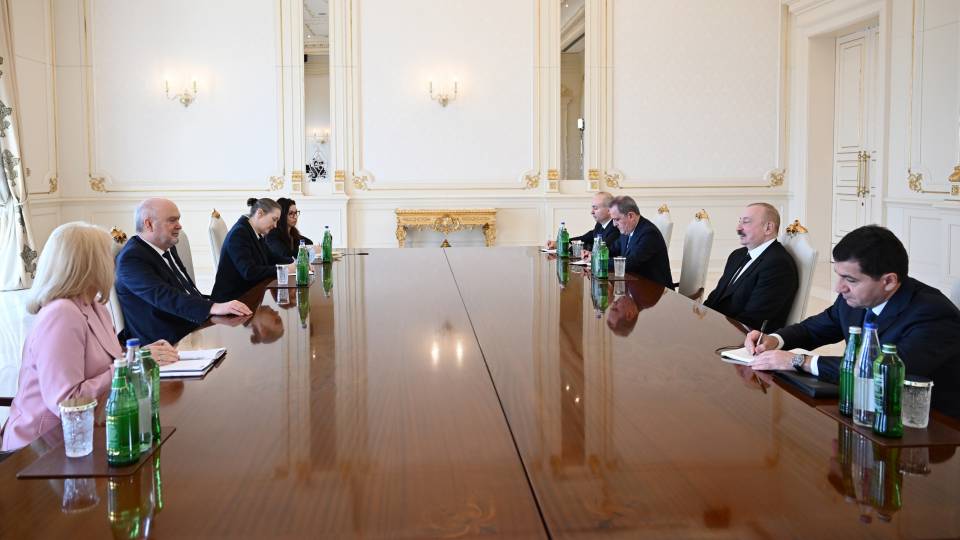
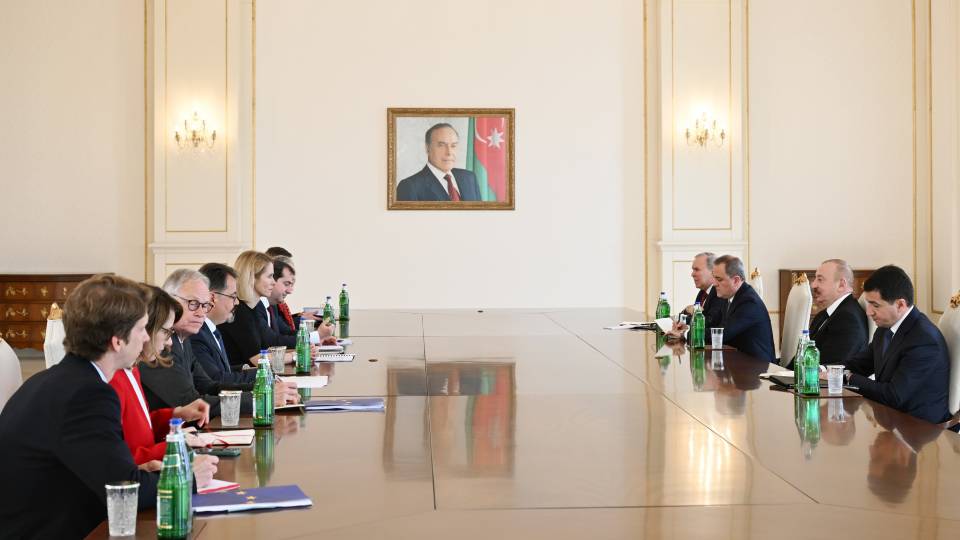
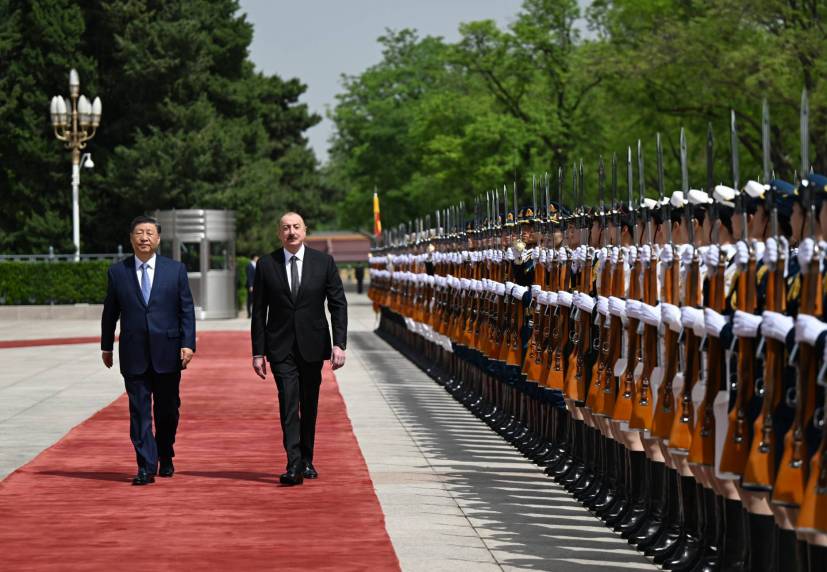
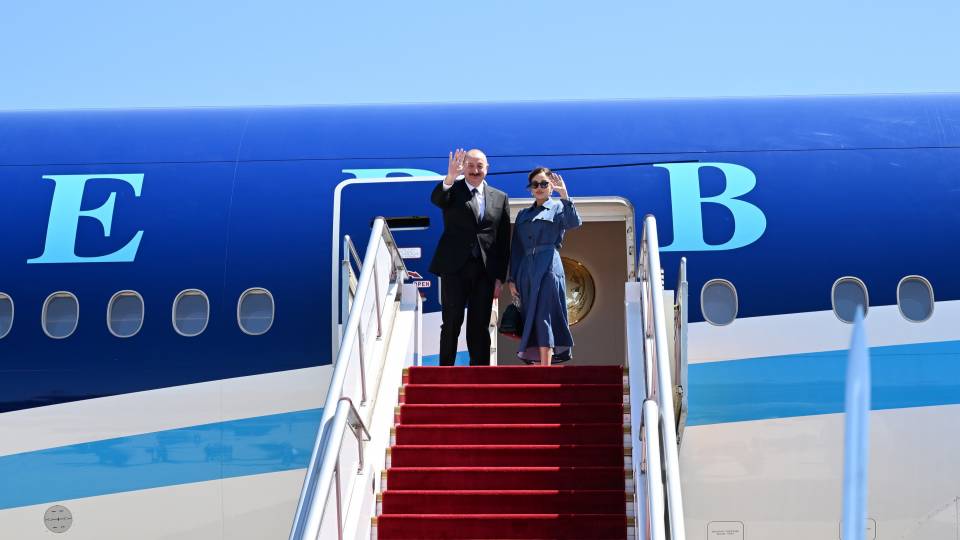
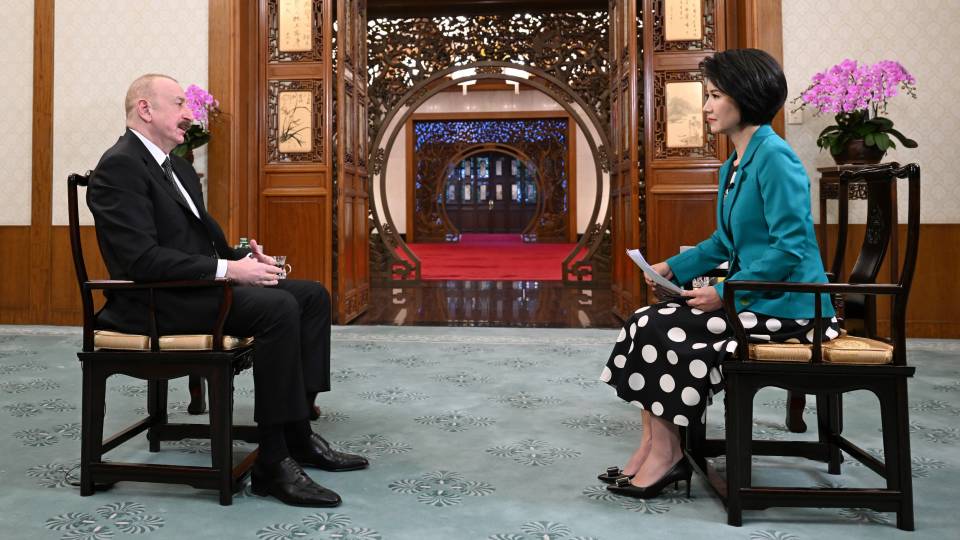
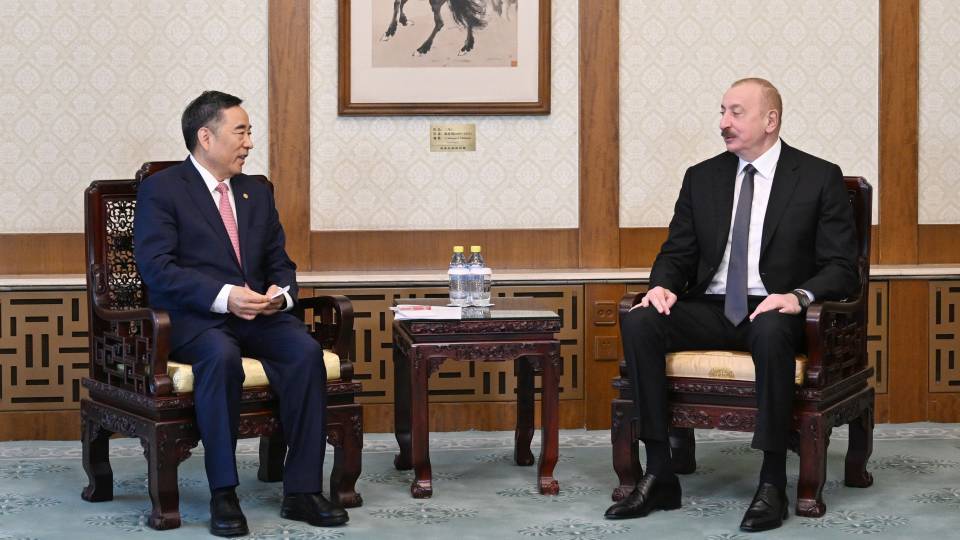
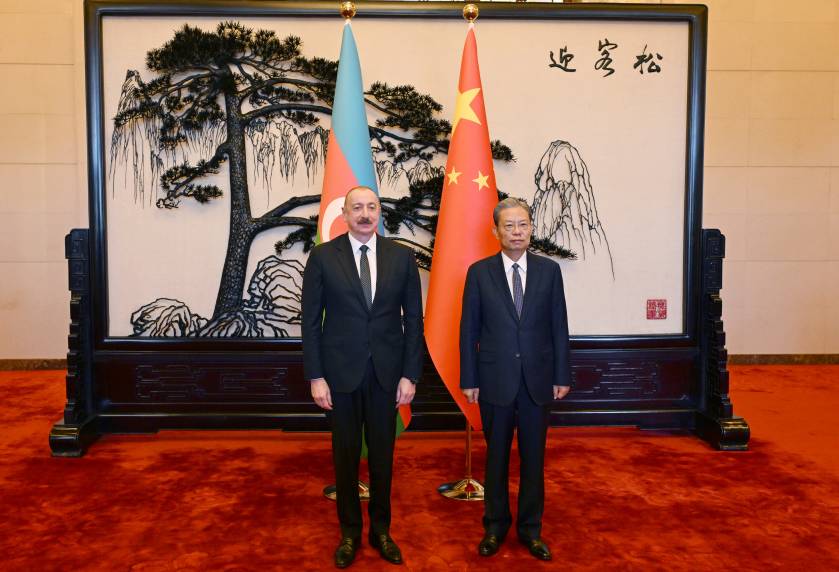
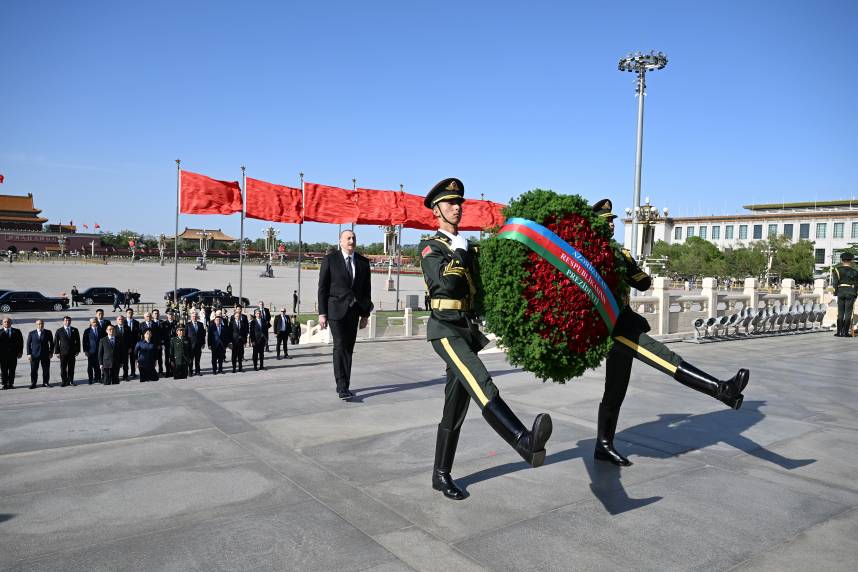
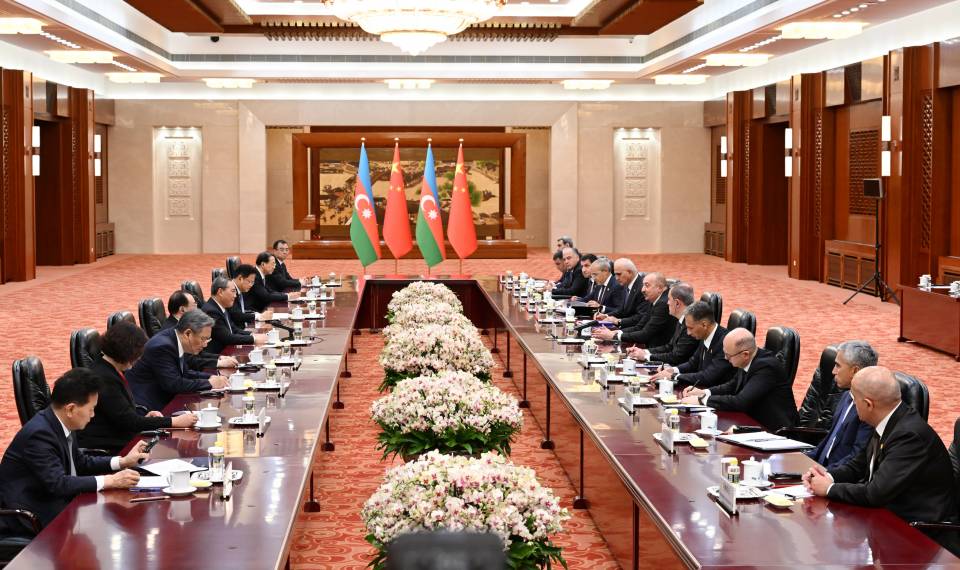
On April 23, President of the People's Republic of China Xi Jinping and First Lady Peng Liyuan hosted an official banquet in Beijing in honor of President of the Republic of Azerbaijan Ilham Aliyev and First Lady Mehriban Aliyeva.
23 April 2025, 12:15